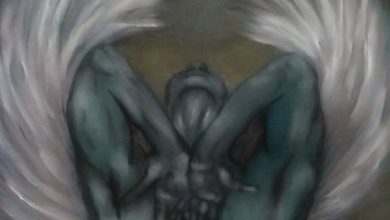Eating Poetry by Mark Strand is a surrealist poem that explores the idea of “consuming” poetry. The poem, consisting of six stanzas each containing three lines in a form commonly known as tercet, talks primarily about the speaker’s boundless delight in ‘eating’ or consuming poetry. His joy is so powerful that it engenders a surrealist metamorphosis of the speaker into a dog, while the gloomy and apprehensive librarian watches on.
Mark Strand is a Canadian-American surrealist poet who was America’s Poet Laureate in 1990, as well as the winner of the Pulitzer Prize for Poetry in 1999, and one of the leading figures of contemporary surrealist poetry in America. “Eating Poetry” is a part of his collection Reasons for Moving, published in 1968.
Eating Poetry | Summary and Analysis
“Ink runs from the corners of my mouth.
There is no happiness like mine.
I have been eating poetry.”
The narrative voice uses the first-person narrative device, which can be viewed as reflecting not only the narrator but also the poet’s happiness from ‘eating’ or reading poetry. The titular phrase ‘Eating Poetry’ can be a pun on the word ‘consumption’, which is often used to denote the act of reading poetry or literature in general. The lines are short, sharp, and precise, a pattern that continues throughout the poem. The poem is written in free verse, with an occasional rhyming couplet inserted in the middle of non-rhyming lines.
The reference to ink running from the corners of the narrator’s mouth brings to mind the image of a pen, which can be interpreted as an allusion not only to the process of reading it but also to the process of writing/creating it, for we know that it is primarily for the purpose of the latter that pen and ink are essential. In a larger scheme of things, this line can be a comment on the interrelation between reading poetry and writing it, since to be able to write good poetry, one has to first read it. The dominant literary device used here is metaphor.
Eating Poetry | Analysis, Lines 4-6
“The librarian does not believe what she sees.
Her eyes are sad
and she walks with her hands in her dress.”
In the second stanza, we are introduced to the only other character featured in the poem, the librarian, establishing the poem’s setting as that of a library. The librarian, we are told, is shocked to see the narrator’s antics, or perhaps she is unable to understand or relate to his passion for poetry. Her manner of walking ‘with her hands in her dress’ has an air of glamourous superficiality about it, possibly pointing towards an absence of true interest in her profession, which would explain her inability to sympathize with the poet’s insane amount of joy and excitement at reading poetry. Her ‘sad eyes’ may be a result of her perceiving the narrator as having lost his mind, a label that is often attached to poets, artists, and geniuses.
There exists a wide gap between the poet’s love and understanding of poetry and the librarian’s, a gap that only keeps increasing as the poem progresses. The figure of the librarian functions in a way similar to the chorus in a Greek play, guiding and mirroring the reader’s reaction to the narrator’s transformation. The dominant literary device used in these lines is alliteration.
Eating Poetry | Analysis, Lines 7-9
“The poems are gone.
The light is dim.
The dogs are on the basement stairs and coming up.”
The third stanza sees a sudden darkening in the mood and tone of the poem, strengthening the surrealist elements in its premise. We are told that ‘the poems are gone’, which can be an implication of two things – either that they have been destroyed by the poet who literally ate them, or that they have been metaphorically consumed and read in an act of absorbing existing knowledge and artistry and producing or recycling it to something entirely new.
The dim lights serve to add an ominous undertone to the setting, and the sudden appearance of dogs in the library keeps with its general theme of surrealism. This stanza also introduces the theme of the destructive potential of excessive literary consumption that transforms the reader/eater into something else altogether, as we will witness in the following paragraphs. Anaphora is a literary device that has been used in these lines
Eating Poetry | Analysis, Lines 10-12
“Their eyeballs roll,
their blond legs burn like brush.
The poor librarian begins to stamp her feet and weep.”
The ominous undertones that the introduction of the dogs did in the poem turn darker and more menacing in this stanza, with semi-gothic descriptions of dogs with eyeballs rolling and blond legs burning. The librarian is scared and puzzled, not knowing what to do since the dogs here symbolize a destructive, disorganizing force, an antithesis of her role as a preserver and organizer of the library. She is as distant from these dogs as she is from the narrator. Alliteration, assonance anaphora, and simile are the literary devices used in these lines.
Eating Poetry | Analysis, Lines 13-15
“She does not understand.
When I get on my knees and lick her hand,
she screams.”
As mentioned in the analysis of the previous stanza, the librarian is as distant with the narrator, as he is with the dogs, failing to understand their mad, destructive passion for poetry. In the second line, however, the surrealist metamorphosis of the poetic voice begins, where he starts crouching and licking like a dog, terrifying the librarian. It is this transformative and potentially destructive power of poetry that forms the thematic crux of the poem, making the poetic voice forget his own identity, transforming one to the greatest extent imaginable. Here, the poet’s transformation is surrealistic, fantastical, and scary, eliciting fear and astonishment in both the reader and the librarian.
Lines 13 and 14 form a rare rhyming couplet in the poem while line fifteen goes back to the original, unrhymed free verse pattern. Alliteration and symbolism are featured in these few lines.
Eating Poetry | Analysis, Lines 16-18
“I am a new man.
I snarl at her and bark.
I romp with joy in the bookish dark.”
In the final stanza of the poem, the narrative voice consciously acknowledges his unnerving metamorphosis in the poem for the first time. He appears to exhibit characteristics of a rabid dog as he snarls and barks unprovoked at the librarian, wandering off aimlessly around the dark corners of the library.
The dark, animalistic transformation of the narrator serves as a testament to the strong transformative force that poetry and art hold, to be understood, experienced, and appreciated only by a select few who understand the true genius of the poetic form as it penetrates their mind, rupturing and maddening, while common readers, much like the librarian, fail to gauge the depth and strength of this transformative potential of poetry, staring from afar in wonder, amazement, and horror as we see people metamorphosing under the poetic influence in front of our own eyes. The poem ends with another rhyming couplet, illustrating the use of consonance.


